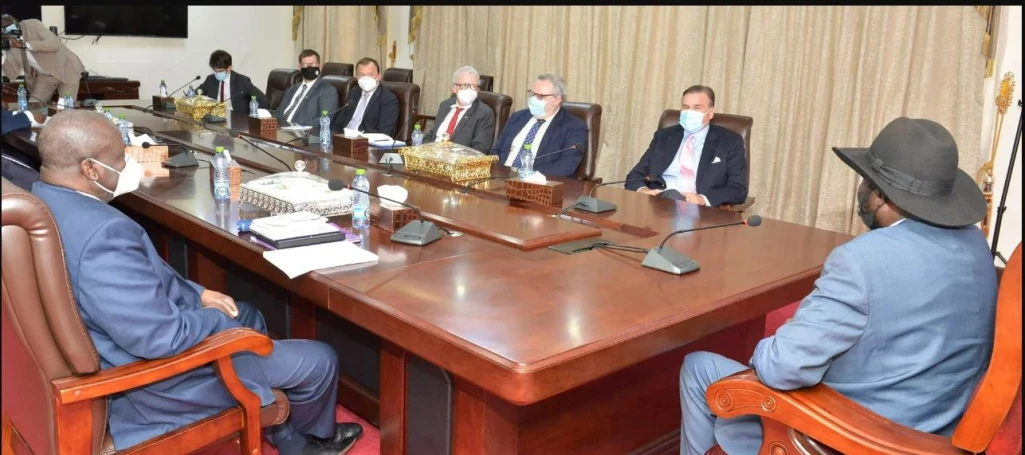
South Sudan’s largest donor countries have abstained from a vote to extend the transitional period for the revitalized peace deal.
The United States, United Kingdom, and Norway – who are known as Troika refused to endorse last month’s roadmap by South Sudan peace parties to prolong the timeframe for the implementation of the 2018 peace agreement.
On Thursday, the Revitalized Joint Monitoring and Evaluation Commission (RJMEC) validated the extension of the transitional period for 24 more months.
On August 4, 2022, the ITGoNU, SPLM-IO, SSOA, FDs, and OPP signed an extension roadmap “to ensure the parties complete the implementation of the remaining provisions in the agreement.”
In its extra ordinary meeting, RJMEC chairperson, Maj. Gen. Charles Gituai asked the members of the peace implementation monitoring body to indicate their views on the extension.
“Do you as RJMEC members wish to make a decision on the extension of the transitional period today (Thursday) or after three (3) months to give the RTGoNU time for consultations with the citizens before an extension?” he asked the forum.
The decision in the extraordinary meeting was arrived at through voting by show of hands.
“37 out of 42 members present today voted in favor [of extension by 24 months]. 5 did not vote while one was absent,” said Maj. Gen. Gituai stated.
Among those who abstained from voting in favor of the roadmap are representatives of the United States, United Kingdom and Norway.
The countries said they are not convinced that the TGoNU is committed to the implementation of the agreement in latter and spirit.
“South Sudanese leaders again extended their time in power despite failing over the past 4 years to deliver fully on the commitment they made in the 2018 revitalized peace agreement. The Troika as voting members of RJMEC, could not support the extension at this time,” Troika said in a statement.
The United States, United Kingdom and Norway instead voted in favor of more consultations with the citizens, civil society and other stakeholders on the roadmap.
The slow pace of the implementation of the 2018 peace deal has been attributed to a lack of political will and funding by the unity government. Its partial implementation has largely been attributed to the lack of political will from the leaders.
“We require further evidence of the government’s commitment to deliver on the new roadmap and fully implement the R-ARCSS as an agreement continue to represent an opportunity to build peace and stability in South Sudan,” Troika said.
Crucial reforms unrealized in the 2018 peace deal include institutional reforms, enactment of permanent constitution, graduation of unified forces, funding of reparation and reconciliation bodies, among others.
The three nations initially funded the peace monitoring bodies, RJMEC and CTSAMVM but withdrew their financial support in June 2022.
Troika reiterated its decision not to support the prolonged peace process.
“To date, the R-ARCSS has prevented a return to large scale conflict but it has not delivered democracy, peace, justice or opportunity for the South Sudanese people. They are paying price for non-implementation through the extreme violence and abuse visited upon civilians across the country. We call on South Sudanese leaders to shoulder their responsibility,” the statement underscored.
In response to the abstention, the government spokesperson Michael Makuei Lueth said the parties to the revitalized peace deal are not bothered by Troika’s decision.
“Originally Troika is not a signatory to the agreement and they are not even supposed to be sitting here [RJMEC meeting] but we allowed them to sit, and if they have come here to obstruct our own initiative and they abstain from it, then we will continue without them,” he stated.
“This time, the agreement will be implemented from our own resources. We will not rely on others,”Makuei emphasized.
Troika, however, stated that its reservations will not affect its commitment to the people of South Sudan.
“Our lack of support for the proposed extension in today’s (Thursday) extraordinary RJMEC meeting, does not diminish our commitment to the South Sudanese people’s quest for peace, prosperity and democracy,” it affirmed.
Among many other recommendations, RJMEC has asked the RTGoNU to commit to the implementation of the roadmap that the parties have written and signed.
The next transitional period will begin on 23rd February 2023 to 22nd February 2025.